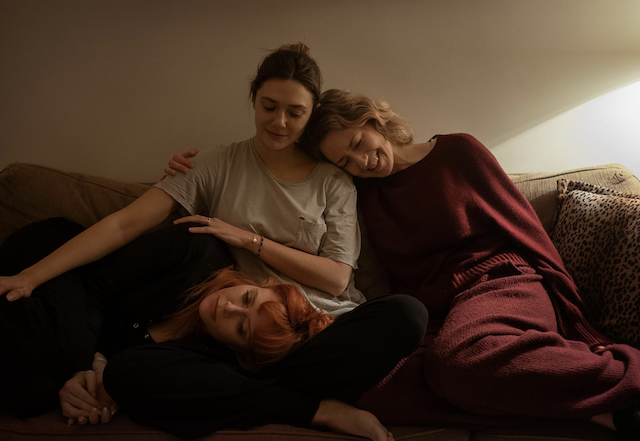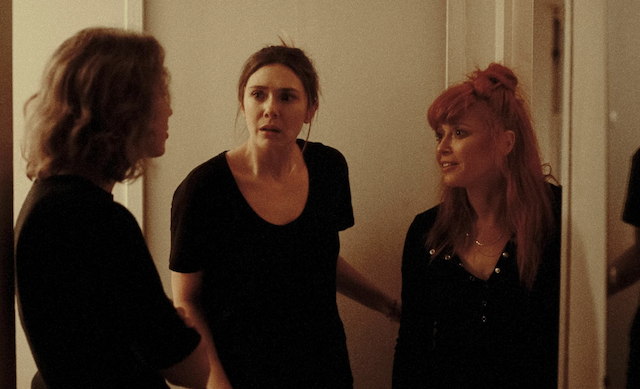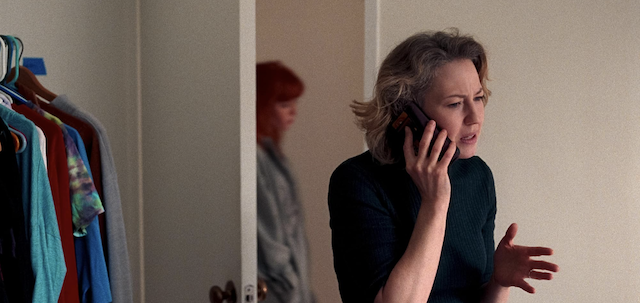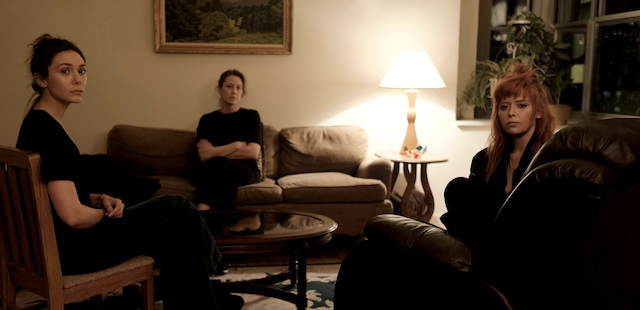

©Courtesy of Netflix
Derek Cianfrance: Did you all like the movie? Azazel, I’m in the middle of pre-production on a movie myself, how do you make a good movie? What should I do? lol
Azazel Jacobs: Oh, you’re doing it, keep doing it. Thank you, I know you’re so close to shooting. Thank you for coming here, I desperately needed to make this film for personal reasons. Having that drive was absolutely essential. It doesn’t mean it’s going to be a good film. But it was something that I had to find for myself. I needed to take filmmaking, and bring it to this place I was experiencing with my parents, bring that joy and sense with something so emotional and out of control that was the base of everything.
Derek Cianfrance: Can you tell me about when you started writing this, your process was very regimented. You were going to write the script. You were going to print out the script to the actors you knew. You were writing it for certain actors you weren’t going to do traditional casting. You knew who you wanted in the film. You knew how much money you were going to get. You were going to shoot on film. Can you just talk about these decisions? What got you to the point?
Azazel Jacobs: It didn’t feel like a decision. It felt like instincts, and I wanted to trust those instincts. When I started writing, wake up early with a little notepad, walking around the city and finding such inspiration of just life, of people walking around and just getting glimpses of what people were going through, or at least what I imagined they were going through these window into humanity that we all witness so much living here.
I was writing random ideas, until I realized these disparate stories could be embodied in different sisters, under one house, this creates a fuel and a conflict that will drive, and so once that understanding, then the writing of it was very clear and about third way in, I started imagining Carrie and Lizzie and Natasha and Jovan, and I could hear their voices.
There was a rhythm I was chasing after, when you know someone is going to pass, what it does to time is very specific. It changes and elongates certain things. It’s just, the feeling of going through, waiting, dreading, realizing and accepting has this effect on time.
There’s a rhythm to the whole piece including the heartbeat monitor being fans of those actors and enough of a fan that could hear their voices more than even picturing them and just how that could conflict with each other and sync led my path forward in every way.
Once I finished it, I wanted this film to exist in a very different world than emails. I wanted to just take it away from the computer so that I was close enough to each of them that I could get their physical address and get it directly to them with a letter saying, hey, if this is something that you respond to, I will shoot this in location, on film. I’ll have my final cut and we’ll be partners. We’ll be filmmakers together through this. And they all did, and that really led us.
Derek Cianfrance: One of the things I admire in this film is limitations. You chose limitations of space, limitations of time. Limitations of characters. You’re not doing flashbacks, and yet it’s like a remarkable magic trick that you’ve made. Full histories of these people. And I just, can you talk a little bit about limitations? That’s one of the things that just inspires me the most about this film.
Azazel Jacobs: I was coming from Work where I had been in a situation where I had done coverage and would figure out the scene in the edit room and that is fine. And that’s fine for certain things. I just didn’t want to do this. I wanted to figure out what the scene was before shooting and down to the point that I knew I would be editing it, I felt I couldn’t communicate that.
Working with an editor, I had to be direct. That went all the way down to me being very specific working with Sam Levy(D.P) on the angles and how people would be isolated from frames. Using this apartment as knowing that we’re going to be in there for so long. How do I dole that out so that as the characters start revealing themselves, the apartment, the layout starts revealing itself.
Just utilizing all those things whenever I could as an advantage. And we shot over 17 days, but the truth is, when you’re shooting in lots of locations, you’re spending so much time moving. And setting up, and that never really happened. The equipment was all there, and we just were shooting.
It was 17 days, but full of shooting. Really being able to take the limitation, or let’s just say one location for most of it, and turn that into shooting as much as a lot of it, in order was something I hadn’t done for years since I made much smaller films. I always thought, wow, that really has it.
That’s one of those things that you can only get when a film is so small that you can do, so that when we’re shooting, Whatever scene, we can talk about something that happened specifically that we had actually shot beforehand. We’ve already, we’ve gone through, and build up on that generally when we get to that scene, an earlier scene, because we’re shooting out of order, we have to remember where we landed rather than where we’re coming from.

©Courtesy of Netflix
Derek Cianfrance: Did you ever have to go back and reshoot things?
Azazel Jacobs: No, not that I know. The only scenes split were the father scene shot at the end and that really was the only everything else we were able to shoot complete scenes if not one multiple ones each day.
I can’t remember anything specific. We had a great crew when we shot that first scene of them all sitting at the table and the first line for everything is Carrie Coon giving this it’s one thing to write that and a very different thing to see it.
I told them how I was going to be shooting this and isolating these angles full takes each time. But when she delivered that. She came out swinging so hard that it had this wave, of course, of an effect on the other actors, but it really had this wave that carried over the crew.
I could feel the crew get energized and focused, things moved smoothly when people were truly investing, Not only their skill, but their heart into what they’re doing. And it goes all the way to we never did ADR.
We never went back and recorded lines because it was done beautifully, going back would have been really challenging. I’m not sure how I would have done it, but I was lucky that the sound was good. Everything was boring.
Derek Cianfrance: What role does shooting film aid in performance?
Azazel Jacobs: We would get to the place that when we were shooting, we committed to something. It wasn’t that we were going to figure things out. We committed to rehearsing. We rehearsed before the scene. We have three or four days of rehearsal in the space, but in terms of if I’m going to start shooting, it wasn’t, we weren’t going to figure out, we really didn’t change blocking once we started shooting.
And that also gave us a limitation. So if there were certain things that didn’t work in terms of tempo, it was still going to be in the confines of how they moved if somebody got out of the chair or whatever it was. The other thing that was great was strongly committed to the script, so there was no conversation.
Things that could be pre-planned are great because it asks you to be precise. We can’t put out a ton of lights. We’re not hanging lights outside. Walls are not disappearing.
The ceiling is what it is. Film is so flexible, very giving, knowing that looking at a monitor, wasn’t looking at the final frame, was really helpful. It made me keep being present with them and realizing yeah, I could get a sense of the framing but I shouldn’t get caught up in the colors or anything other than, sit next to Sam Levy, the cinematographer, and really be there with the actors and the witnesses I thought was miraculous each day.
Derek Cianfrance : Are you looking at the actors or the monitor?
Azazel Jacobs : It depends If I felt it was okay, I would try to be as close as I could and see. But there were moments they needed to be spaced out. It depended on the emotional level. I remember the scene where Natasha opens up during the sit down, being very close to her and just feeling like it moved me deeply, just seeing it in real time.
Derek Cianfrance: You mentioned these actors were your collaborators throughout. Does that include editing? Do they watch the edit?
Azazel Jacobs: I had this romantic Robert Altman idea of you guys come, we’ll watch dailies and you come to the edit. And at the end of the day, they were very trusting. By the time I finished each day, going through the dailies wasn’t going to happen. I offered the edit room and Only Busy took me up on it for a day. I just wanted them to know they were welcome. I was going to them, not only as actors, but as filmmakers. Collaborators that I felt like they have experience not just through, on acting, but they’ve been on so many productions, and they have something to teach me.
Derek Cianfrance: Okay, speaking of editing and cuts, you showed me an early cut of this film. I remember that you should take out the ending when the father wakes up. I just want to say, I was wrong.
Azazel Jacobs: It was great you said that, because I did sleep at all that night. I was like, oh my god. The truth is that you go to film school and they go, if a film works without a scene, if no one would notice it gone, then you don’t need it. So it was interesting to realize I could pull that scene out. They could go into the room, we could cut to them with an empty chair. That story worked. It felt like a clean story, but then there was this thing that when I was writing felt scary and terrifying about this and it felt like I was just going to swing for it and see if it worked.
You told me that. I did not sleep with Diaz, my producer, my partner, wife, collaborator, she came to the edit the next day, we talked about the scene. She said if the scene is in, every frame has to deserve it. Every frame you have to go through At least four minutes, it made me precise, I have to make this worthwhile, give me that same sense and hopefully give the audience the same sense of what was needed to tell the story.
Derek Cianfrance: Yeah, it transcends Lizzie has the line early where she talks about how death is represented in movies and fiction, and how their dad railed against that and said the only way you can understand death is through absence and everything else is fantasy. I didn’t understand that when I first saw it..
Azazel Jacobs: I needed this fantasy myself. I wanted to hear, I wanted to imagine a world where there are last moments where we get to say I love you. I’m sorry, the sisters aren’t hearing this, we get to hear that this is for us. Oh, we get, they knew who he was. We didn’t get a sense of, he’s just always in this room. His absence means something. There’s a weight behind it. He’s a person.
Derek Cianfrance: Where did you come up with his story?
Azazel Jacobs: This is somebody I love who I lost many years ago, think about all the time.

©Courtesy of Netflix
Derek Cianfrance: Can we talk about editing? I was amazed at how tight the movie was. You go from one scene, dialogue into the next with very little air. you wanted it faster and faster. Can you talk about how you came up with that decision? The instinct in a lot of films is to linger in spaces. Yeah, and the other thing I found myself doing is, because of rushing.
Azazel Jacobs: Hopefully we’ll spend time on this one shot, and it’ll be beautiful. then I’m faced with how to affect time? Now I’m dealing with real time. I was chasing not real time and this idea of not having transitional moments out of this world, or life I wanted no opening credits. To jump in with this heavy conversation. I wanted this to be abrasive, especially in the beginning, so we’re just forced into it and forced to reckon with how these people are presenting themselves. It’s very theatrical at first. The editing was fun because I went through the scene beforehand.
I wound up doing a color coded version of the script. Whenever I thought I would be on somebody, that would be a certain color so I could look at it like a piece of music then see how many angles that I would need to get that sense of really close cutting so that linger, in certain shots you would feel that weight. But the thing was guided with this sense of. Knowing there’s always this heartbeat monitor, this metronome they’d use that would come in and out of the story. It was a rhythm I was chasing from the beginning.
Derek Cianfrance: Did you know what they were gonna do?
Azazel Jacobs: absolutely.
Derek Cianfrance: That was in the script. They were going to sit in it, but did you know how each performer or character was going?
Azazel Jacobs: Yeah. It is so cool talking about this. I am excited they would do these things and If I had a different idea, I did not remember because it felt correct. That happened all the time. If I was going there, I was like, no, you wouldn’t do that.
That never happened, because they embodied it so quickly, it was just a matter of me staying the script. They came in off book about everything. Even though they’re such different performers.
They came in with a discipline of people loving what they’re doing. There’s a craft that was written. But you write these things then you write Lizzie, you start singing this nursery rhyme.
You don’t truly know. I know the three of them are going to sit, I know she’s in the middle. Rachel will go this way and that way, but seeing it is different then you feel like, oh, this is working. The thing that most went off in terms of me not knowing exactly how it was going to work in terms of framing beforehand was once James Sanders came as the father.
It was a disruption to shake us up and have him lead, I knew he was going to get the beer, and go to the table. Once he came back, he started having such an effect on the sisters and really on the actors. So them taking themselves and leading and taking a sit down, that just flowed into that.
I just had them, they were holding each other. But they naturally went and went into this. So it’s story time, sitting right in front of them.
Derek Cianfrance: This is really helping me, with Jay, when he came into the movie did the actors meet beforehand?
Azazel Jacobs: The actors had never met each other beforehand. So day one of rehearsal was the first time they were seeing each other. But they were fans of each other. I think Carrie knew Jay, but never worked. But really we shot that at the very end, just like how shooting in order allowed us to do.
By that point they had become close and the crew had a rhythm. It was a disruption to have a new force in his own way. But he also came in so prepared, he had this, whatever, ten page monologue down. And so I could give him full takes. had the same type of disruption On the crew, on the actors, similar to what the father would be doing in real life.
Derek Cianfrance: Okay, the last thing I want to talk about is New York City. You made an ultimate New York movie. Now you’re showing it in New York. What a dream.
Azazel Jacobs: You had no idea, and then you left. Yeah, I grew up here. This is home, and I left for a long time, and I always, even though I was for many years away, it was always a different feeling coming back here to being with friends and family and parents but then actually moving all my stuff back here expecting a good time, you know what happened I would come back to visit and go, Oh no, this restaurant’s gone, that spot’s gone, this building, that’s been out of the bank for a while.
But then, when I moved back I was like, Oh shit, it’s still here, this is here. It flipped, and I was so happy with what was still standing. And there were so many things where I would just walk through and I would be like, Nine years old, skating through here.
I see so many ghosts. So many friends have passed on. I feel them everywhere. I wanted to show people still walking these streets and still here with us.
Derek Cianfrance: Beautiful. The bodega is open at 10 a. m. That’s a frustration, there’s a weed shop, the wholesale one, it’s funny you bring that up, because getting that place was, like, found the right place, the courtyard is right, it all fits, I usually just don’t care at all.
Azazel Jacobs: If somebody walks out the door uptown and somebody downtown, I don’t care. In this case I saw a path the city gave me, this apartment downstairs, she looks at the window, Natasha is right outside.
No. Trying to match or fake things, the city expanded for a film like this, done for its entirety for different arts.
Derek Cianfrance: You almost let the city make the choices for you.
Azazel Jacobs: Chose the central place, found the timing of the train. It’s a shooting in there. Train now.
Derek Cianfrance: Why go to the one scene that leaves the confines of the courtyard, but you go to the store. Talk about that choice to leave where does that come from?
Azazel Jacobs: I needed an outside note. I really needed a note that wasn’t, it’s our only hand held shot, right? It’s the only time the camera gets hand held. I really needed something that broke up this ribbon, this kind of thing that was very regiment, so you get a sense of, like, when we step up with Rachel, there is this whole other life and other people and things that are going on outside this family.
I loved shooting in a complex like that, with the idea that not only are the walls thin from hearing each other, but potentially next door, below or above the same thing was happening
Derek Cianfrance: Congrats!
Azazel Jacobs: Thank you, Derek.
if you like the Q&A, share your thoughts below.
Check out more of Nobuhiro’s articles.
Here’s the trailer of the film.

